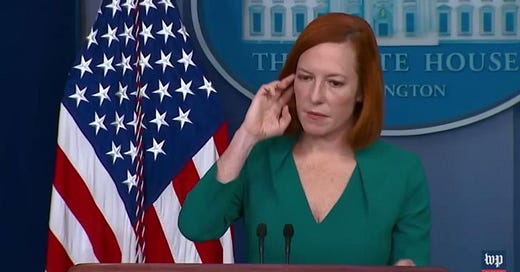Chalk up executive action on student loan debt forgiveness as yet another broken promise from the Biden administration.
That’s the word from Press Secretary Jen Psaki who told reporters on Tuesday that the president won’t act alone to forgive a portion of the debt before repayments start on February 1, 2022.
“If Congress sends him a bill, he's happy to sign it,” Psaki said. “They haven't sent him a bill on that yet.”
This is, to put it bluntly, bullshit.
Your support makes these stories possible. Please consider a paid subscription today.
“A very long way to go”
Biden campaigned explicitly on a promise to forgive a minimum of $10,000 in student loan debt, telling voters that he’d act to lessen their burden in the interest of economic recovery.
“It's holding people up. They're in real trouble,” Biden said during a speech on November 16, 2020. “They're having to make choices between paying their student loan and paying the rent, those kinds of decisions. It should be done immediately.”
The administration has had a memo that may authorize Biden forgiving debt without going through Congress since April, but they won’t release the text.
“There is a very long way to go to deliver on the promises for student loan borrowers, between what was promised and where we are," Seth Frotman, executive director of the Student Borrower Protection Center, told Insider in June. "A lot of that is obviously because of how broken the system is and how many of the problems we're facing are decades in the making."
All that intrigue is somewhat beside the point for people facing the restart of a hundreds-of-dollars a month bill that will severely curtail their spending power and cut down on their standards of living.
Vicious cycle
To get a sense of what those of us who have student loan debt are facing with the looming repayment restart, I talked to George Pearkes, Global Macro Strategist at Bespoke Investment Group. He also writes a column for Business Insider focused on markets, economics, and political economy.
You can hear our full conversation at the link, but as a preview, here’s George explaining how that interest you’re paying works—and why those early payments that don’t make a dent in the principal actually make a certain kind of sense under amortization.

George also broke down how the interest accumulates as you’re in school, a vicious cycle that makes it impossible to get ahead of the debt in time.
“Let's say you started in September of 2021 you've taken out a $5,000 loan to help finance your tuition payment for your freshman semester in college 2021,” George told me. “Let's assume you're doing a bachelor's degree four years and you've already borrowed $5,000, well you don't have to pay anything on that $5,000 that you've borrowed—in fact you don't have to pay anything on it until a year after you graduate.”
In the interim, however, the interest is accruing, meaning that the $5,000 you borrowed may well be around $7,600 once you start paying it off.
Lifelong loyalty
It’s easy to understand why restarting the payments would be political poison for the Democrats. But, George said, they may be motivated by tamping down inflation—as ridiculous as that sounds.

The political benefit of forgiving the loans is obvious, as Ben Beckett wrote for Jacobin:
Canceling student debt would inspire lifelong loyalty of the kind FDR enjoyed, the type of legacy Biden has frequently claimed he wants. Beset by two major recessions during their earning years, dramatic increases in rent, stagnating salaries, and of course ballooning student debt, millennials collectively own less than 5 percent of national wealth, compared to baby boomers’ 21 percent when they were the same age as millennials are now. (Baby boomers now own about 54 percent of national wealth, since in addition to enjoying more favorable circumstances, they have had more time to accumulate it than millennials.)
One hopes the Democrats will realize the benefit of extending the freeze. But I’m not counting on it.
If you liked this story, please consider a paid subscription.



